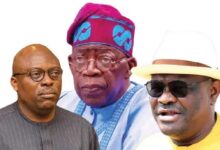The 10 Deadly Sins Against Brand Nigeria’s Greatness (2)
 At independence, in 1960, Nigeria was at the brink of greatness. Three strong regions: North, West and East existed. Individually, they were strong corporate entities; collectively they held the promise as a symbol of pride and greatness for the black race, for Africa. Fifty-two years after independence we are still playing catch-up. Permit me to proffer some reasons and solutions…
At independence, in 1960, Nigeria was at the brink of greatness. Three strong regions: North, West and East existed. Individually, they were strong corporate entities; collectively they held the promise as a symbol of pride and greatness for the black race, for Africa. Fifty-two years after independence we are still playing catch-up. Permit me to proffer some reasons and solutions…
Continued from last edition
6. SIT-TIGHTISM
In every other profession in Nigeria, a new generation of leadership evolves after a particular group has served meritoriously (or non-meritoriously). A new crop of professionals who would usually have been groomed and primed for that purpose are invited and encouraged to take on the reins of leadership. The result has been that such institutions such as First Bank, UACN, NTA etc. have had people who joined the system at entry level risen to the apogee of the respective institutions and lifting the institutional brands to the next level. This scenario is also what plays out in the political leadership of great nations.
The case is however different in Nigeria. Despite the swan song the youth have listened to over the decades that “the youth are the leaders of tomorrow”, generally, that tomorrow has remained elusive for almost 5 decades. Political leaders have held on with a vice-like grip to political leadership such that many names that debuted in political leadership in the 60s and 70s in the country are still in various leadership positions today!
Where they do not hold direct positions, they remain in the sidelines controlling things through their anointed ‘sons’ and ‘daughters’. Is it any wonder therefore that while the First Banks and the Nigerian Breweries of this world can compete favourably with their peers anywhere in the world, the same cannot be said about Brand Nigeria?
SOLUTION: According to John C. Maxwell “A leader is one who knows the way, goes the way and shows the way”. Nigerian leaders have for so long been going the way, most times the wrong way at that, and they have therefore been unable and unwilling to show the way. There is a reason why athletes and all other professionals retire. The mind and body can only function optimally within a certain point in one’s life-time. If leaders refuse to hand over the baton responsibly and peacefully they give the next generation no option than to take it forcefully. Worse-still they put the country at the risk of being retarded by their generational benchmarks or, worse still, degenerate into anarchy. Society is dynamic and ever evolving, there should be no difference with political leadership. Leadership should change hands at given periods with a clean break from the past.
7. DERAILMENT OF VALUES
A good number of values that are intrinsically Nigerian have been abused, debased or perverted. We are known worldwide for our traditional courtesies and respect for elders. This value cuts across creed, tribe and tongue. However, traditionally, elders generally respected themselves and comported themselves with dignity and integrity. They generally stood for the truth no matter whose ox was gored, promotion of excellence and stood on a moral high ground failing which they would bury their heads in shame.
If our elders represent leadership in Nigeria then they have failed woefully and this is not just at the political level. A do-or-die mind-set has made many a parent actively make his or her child cheat at
examinations, swear false affidavits for age, swear false affidavits for state of origin while wittingly and unwittingly urging the child to join the madding crowd in order to succeed by hook or crook. Oftentimes these parents bribe teachers and lecturers to give their wards good grades, lecturers on their part actively sell grades for payment in kind or cash, coaches expect bribes from players before they are fielded, clergymen sleep with daughters and wives of the congregation and so on and so forth. How can a child who has experienced and witnessed all these truly respect his parents and elders?
SOLUTION: Respect is earned. Even when it is compelled, its display will only be farcical and short-lived. All elders and leaders should know that the Nigerian youth deserve to be imbued with true Nigerian values of hard work, respect, patience and fear of God. These values are better taught through true-life actions rather than dry sermons. We should remember that he who sows the wind will reap the whirlwind. We must as a matter of priority launch and execute a strategic Family and National Value Reclamation campaign.
8. THE RISE AND RISE OF IMPUNITY
Closely tied to the above is the unbelievable display of impunity by elements within the Nigerian leadership. Our collective sense of shock and outrage has been numbed by repeated incidences of impunity by political and economic leaders. Bank MDs rob their banks blind and claim it is their enemies who are trying to disparage them, state governors and other levels of political leadership milk the states and national resources dry and receive a slap on the wrist for their heinous crimes or worse-still receive a perpetual court injunction against being investigated, invited and prosecuted by lawfully constituted government agencies. If this is not the panacea to impunity I do not know what else is.
A society that allows a section of its citizenry escape justice for crimes of whatever hue while the culprit displays loudly the proceeds of his crime is firstly dampening the morale of those whose duty it is to curb and punish crimes in the first place while also encouraging other citizens to commit similar crimes since it is clear that he or she can escape justice and live larger-than-life thereafter.
SOLUTION: We need to as a matter of emergency clear the Augean stable in the various law enforcement agencies and judiciary. The Nigerian Brand fabric is stymied with systemic corruption. The best point to therefore start a proper cleansing process is in the police, EFCC, ICPC and other investigative and prosecutorial agencies of government. I believe some of the laws establishing them should equally be revised in order to make them nimble enough to respond to the
avalanche of cases. For starters the special anti-corruption agencies should be freed from the clutches of the office of the attorney-general and minister of justice.
9. ABSENCE OF WELFARE & SUPPORT PROGRAMMES
From local governments to states and the federal government there is lack of welfare program for the poor, indigent students, small scale entrepreneurs and so on. On the social pyramid this is where the bulk of the 80% of Nigeria’s 160 million citizens belong. Some governments and institutions sometimes offer palliatives to a tiny group in the event of crisis but these are usually short-term and mostly tokenistic. That is why a program such as NAPEP remains mainly in cities and has presently been turned into a commercial venture by its managers. A hungry man is an angry man. Criminal and terrorist organizations have a multitude of highly qualified candidates in this socio-economic group. As long as there is no well articulated program by government to provide requisite empathy and support they will remain cannon fodder for destabilization and endangerment of the polity.
SOLUTION: Citizens must be made to have a sense of belonging. Let us adapt the British model by providing affordable/free housing for our stranded youth, counseling and training for skills development & acquisition and job placement opportunities for our teeming youth and a Support Framework for small scale entrepreneurs. Nigerian youth among other Africans grew the plantations of America and built the infrastructure for industrialization in the Western world. We must deploy our resources strategically and wisely to develop our land by engaging our youth in productive activities otherwise they will put their energies to destructive use like Boko Haram.
10. ACUTE LACK OF CITIZEN MOBILIZATION
There is a disconnect between the Nigerian Brand and the large majority of its citizenry. What is the Nigerian ideology? What is our war-cry? What does Nigeria represent to you? If the questions are posed to one million citizens, we may get one million different answers. I have noticed a tendency for government officers and their agencies to be didactic when they exhort the public to be good citizensl. Good citizenship cannot be preached or taught. People shouid be made to experience and feel good governance before a strategic campaign is launched to get a buy-in from the stakeholders.
SOLUTION: We do not have to look far for a solution. Let us adapt the Lagos state model. Fashola came into office with a war cry of “Eko O Ni Baje” ie “Lagos will not be Messed Up”. It was apt at the time because of the decay of Lagos environment and infrastructure. It was memorable and everyone could connect with its meaning and message. On assumption of office, Fashola began a massive rebuilding of infrastructure and beautification of the environment. It therefore made a lot of sense that when he launched a major communications campaign using powerful iconic personality brands from religious bodies, civil society, the media and Nollywood, it was not difficult to convince even the vulcanizer, barber and tomato seller to go to his bank and pay their personal income tax for the first time in their lives.
We cannot solve Brand Nigeria’s challenges through quick-fixes but we can at least start doing the right things now to make Nigeria great. May God bless Nigeria at 52! (concluded)











